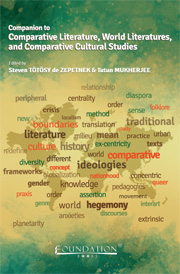Book contents
- Frontmatter
- Contents
- Introduction to the Companion to Comparative Literature, World Literatures, and Comparative Cultural Studies
- PART 1 Theories of Comparative Literature, World Literatures, and Comparative Cultural Studies
- The Contextual Study of Literature and Culture, Globalization, and Digital Humanities
- Comparative Literature and Ex-centricity
- Possibilities and Limits of Comparative Literature Today
- Comparative Cultural Studies and Pedagogy
- Teaching World Literatures
- Comparative Literature and the History of Literature
- Meltzl de Lomnitz, Comparative Literature, and Philosophy
- Comparative Cultural Studies and Cultural Anthropology
- Comparative Literature and Interart Studies
- Gender and Genre in Comparative Literature and (Comparative) Cultural Studies
- Comparative Cultural Studies and Translation Studies
- Comparative Cultural Studies and the Study of Medieval Literature
- Comparative Cultural Studies and Linguistic Hybridities in Literature
- Comparison and Postcoloniality
- (Inter)mediality and the Study of Literature
- PART 2 Comparative Literature in World Languages
- PART 3 Examples of New Work in Comparative Literature, World Literatures, and Comparative Cultural Studies
- PART 4 Multilingual Bibliography of Books in Comparative Literature, World Literatures, and Comparative Cultural Studies
- Index
Gender and Genre in Comparative Literature and (Comparative) Cultural Studies
from PART 1 - Theories of Comparative Literature, World Literatures, and Comparative Cultural Studies
Published online by Cambridge University Press: 05 April 2014
- Frontmatter
- Contents
- Introduction to the Companion to Comparative Literature, World Literatures, and Comparative Cultural Studies
- PART 1 Theories of Comparative Literature, World Literatures, and Comparative Cultural Studies
- The Contextual Study of Literature and Culture, Globalization, and Digital Humanities
- Comparative Literature and Ex-centricity
- Possibilities and Limits of Comparative Literature Today
- Comparative Cultural Studies and Pedagogy
- Teaching World Literatures
- Comparative Literature and the History of Literature
- Meltzl de Lomnitz, Comparative Literature, and Philosophy
- Comparative Cultural Studies and Cultural Anthropology
- Comparative Literature and Interart Studies
- Gender and Genre in Comparative Literature and (Comparative) Cultural Studies
- Comparative Cultural Studies and Translation Studies
- Comparative Cultural Studies and the Study of Medieval Literature
- Comparative Cultural Studies and Linguistic Hybridities in Literature
- Comparison and Postcoloniality
- (Inter)mediality and the Study of Literature
- PART 2 Comparative Literature in World Languages
- PART 3 Examples of New Work in Comparative Literature, World Literatures, and Comparative Cultural Studies
- PART 4 Multilingual Bibliography of Books in Comparative Literature, World Literatures, and Comparative Cultural Studies
- Index
Summary
Abstract: In her article “Gender and Genre in Comparative Literature and (Comparative) Cultural Studies” Ana Lozano de la Pola argues that although the discipline of comparative literature and the fields of cultural studies and comparative cultural studies remain heterogeneous fields of literary study, they are also likely places for crossovers between different theories and methodologies. Lozano de Pola discusses how diverse feminist positions and theories have affected comparative literature and cultural studies over the last few decades, what kind of reception they have had, and what proposals for change have come out of them. Following a brief overview of debates, she discusses one of the aspects she considers productive and socially relevant within feminist comparative literature and culture, namely theories of gender and genre put forward by Judith Butler and Jean-Marie Schaeffer. The two authors' attempts to understand both categories in a complex way and avoiding misleading essentialisms enables us to reach a methodological point of departure from which to begin thinking about building self-defining and literary codes as a complex and inter-related issue.
Introduction
In the discipline of comparative literature and in the fields of cultural studies and comparative cultural studies, the view that feminist criticism—while not yet integrated in pedagogy or in institutional presence (see, e.g., Stabile)—is an integral part of scholarship there is ample evidence of the support of the notion and this is also evident in research and publications.
- Type
- Chapter
- Information
- Companion to Comparative Literature, World Literatures, and Comparative Cultural Studies , pp. 137 - 147Publisher: Foundation BooksPrint publication year: 2014

